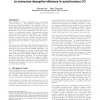Free Online Productivity Tools
i2Speak
i2Symbol
i2OCR
iTex2Img
iWeb2Print
iWeb2Shot
i2Type
iPdf2Split
iPdf2Merge
i2Bopomofo
i2Arabic
i2Style
i2Image
i2PDF
iLatex2Rtf
Sci2ools
111
click to vote
SOSP
2001
ACM
2001
ACM
Anticipatory scheduling: A disk scheduling framework to overcome deceptive idleness in synchronous I/O
Disk schedulers in current operating systems are generally work-conserving, i.e., they schedule a request as soon as the previous request has finished. Such schedulers often require multiple outstanding requests from each process to meet system-level goals of performance and quality of service. Unfortunately, many common applications issue disk read requests in a synchronous manner, interspersing successive requests with short periods of computation. The scheduler chooses the next request too early; this induces deceptive idleness, a condition where the scheduler incorrectly assumes that the last request issuing process has no further requests, and becomes forced to switch to a request from another process. We propose the anticipatory disk scheduling framework to solve this problem in a simple, general and transparent way, based on the non-work-conserving scheduling discipline. Our FreeBSD implementation is observed to yield large benefits on a range of microbenchmarks and real work...
| Added | 17 Mar 2010 |
| Updated | 17 Mar 2010 |
| Type | Conference |
| Year | 2001 |
| Where | SOSP |
| Authors | Sitaram Iyer, Peter Druschel |
Comments (0)

